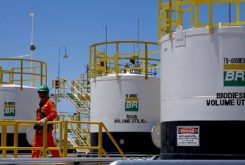Nine oil companies, including multinationals Malaysia’s Petronas, BP Energy, Chevron, and Total Energies, have submitted bids in an auction for the rights to exploit 11 areas in the gigantic pre-salt reserves, located in very deep waters of the Atlantic Ocean off the Brazilian coast.
Norway’s Equinor, Shell, Colombia’s Ecopetrol and Qatar’s Qatar Energy participated in the tender, in which Brazil’s Petrobras will also be bidding, according to the National Oil and Gas Agency (ANP).
If all the blocks offered are auctioned off, the Brazilian state will collect 1.28 billion reais (about USD 242 million) just for the right to participate.
The Permanent Production Sharing Offer, whereby licences are offered to explore and exploit fields in partnership with the Brazilian state, is the first of its kind in pre-salt blocks.
Unlike traditional concession auctions, in which Brazil offers the highest bidder rights to explore and exploit an area, the Production Sharing auction is awarded to the company that offers the Brazilian state the highest percentage of participation in its production.
This tender offers rights to explore and exploit hydrocarbons in 11 different blocks in the Santos and Campos basins, off the coast of the Brazilian states of São Paulo and Rio de Janeiro, with proven reserves in the pre-salt.
There are four blocks in the Campos basin (Água Marinha, Norte de Brava, Itaimbezinho and Turmalina) and another seven in the Santos basin (Ágata, Bumerangue, Cruzeiro do Sul, Esmeralda, Jade, Sudoeste de Sagitário and Tupinambá).
Petrobras, having discovered the pre-salt horizon, has pre-emptive rights in the areas auctioned under the sharing regime, which it has already announced it will exercise over the Água Marinha and Norte de Brava blocks, with a minimum participation of 30 per cent.
This means that if the participating companies have an interest in either of these two areas, they will have to include the state-owned company in the consortium if they win.




